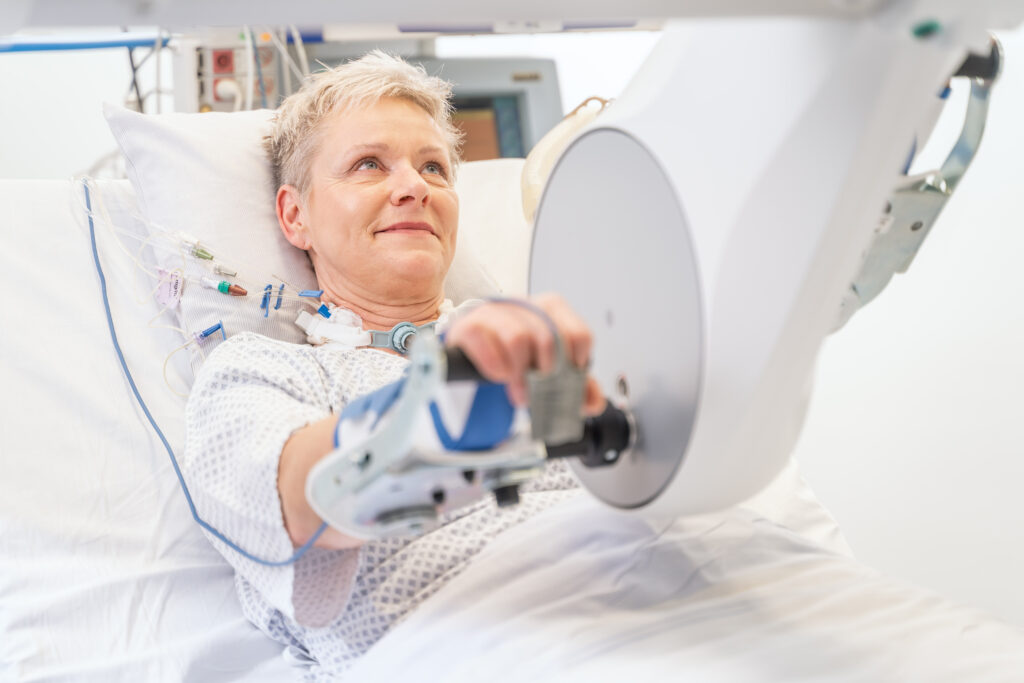
Therapy & Practice
Early mobility matters
Early mobilisation in the intensive care unit is aimed at improving the outcome for the patient, and is increasingly becoming a required standard of care. In the middle of this year, THERA-Trainer launched a large-scale awareness campaign to inform about the opportunities and possibilities of effective early mobilisation in the intensive care unit.
Longer-term intensive care is associated with significant complications. If, for example, patients are mobilised too late after a stroke, heart attack or serious infection, the risk of permanent loss of mobility increases. “Longer-term immobility is harmful, as a decrease in muscle mass and bone mineral density along with impairment to vital physical functions can already be observed within the first week in the intensive care unit,” explains physiotherapist and expert in early mobilisation, Tobias Giebler, of University Hospital Tübingen. “Patients decondition, which goes hand in hand with significant losses in function, reduced quality of life and higher mortality.”
Clinical research suggests that early mobilisation reduces the development of weakness acquired through intensive care. “Patients are mobilised and taken out of bed as early as possible. This reduces the risks and helps patients maintain and improve their physical condition,” says Giebler.
“Longer immobility is harmful, as a decrease in muscle mass and bone mineral density along with impairment to vital physical functions can already be observed within the first week in the intensive care unit.”
Early mobilisation saves resources and is proven to benefit patients
Early mobilisation can reduce the length of stay of patients in intensive care units by an average of two days. This not only saves considerable resources, but is also proven to benefit patients in a major way. Their recovery is accelerated and they find their way back to a self-determined life much more often and faster. This aligns with the overarching goal of clinics to offer patients high-quality care, despite a shortage of resources. However, the practice of early mobilisation is not yet widespread due to barriers in the clinical setting. Knowing about the barriers and identifying suitable strategies on overcoming them can help to make the concept an integral part of the daily routine. “The success of early mobilisation demonstrates the commitment and competence of the interdisciplinary treatment team,” confirms Giebler. “Awareness of the problem is needed, along with suitable solutions for implementation.”
“Our recipe for success for use in severely affected patients in the intensive care unit is the combination of safety, easy handling and variable use.”
Creating awareness of the problem and identifying practical solutions for implementation
With the newly launched “Early mobility matters” awareness campaign, THERA-Trainer is informing health professionals around the world through social media, expert journals and congresses about the advantages of early mobilisation and introducing solutions for implementation from their own technology portfolio. “Our recipe for success for use in severely affected patients in the intensive care unit is the combination of safety, easy handling and variable use,” explains THERA-Trainer CTO Otto Höbel. The ideal product, the THERA-Trainer bemo, is a bed bicycle specially developed for early mobilisation. This means that patients can already be mobilised while lying down in the intensive care unit, before they are able to leave their bed. “The bed bicycle is clinically tested and is linked to a much lower duration of mechanical ventilation, length of stay in the intensive care unit and the occurrence of debility.”
Jakob Tiebel
Related contents
Find related exciting contents in our media library.
Meet our specialists.
Are you interested in our solutions? Schedule a meeting with a Consultant to talk through your strategy and understand how TEHRA-Trainer can help you to advance rehabilitation.